新概念英语第二册第40课-Food and talk
- 格式:docx
- 大小:28.15 KB
- 文档页数:7
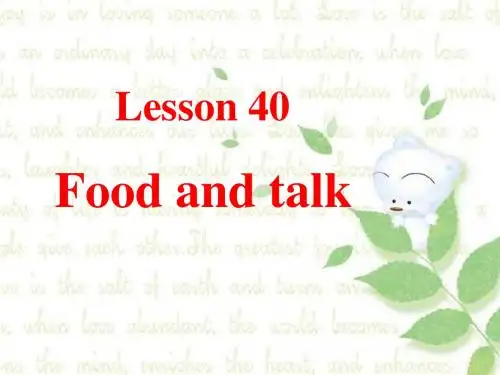
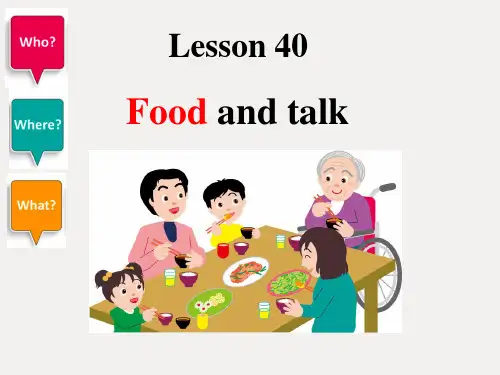
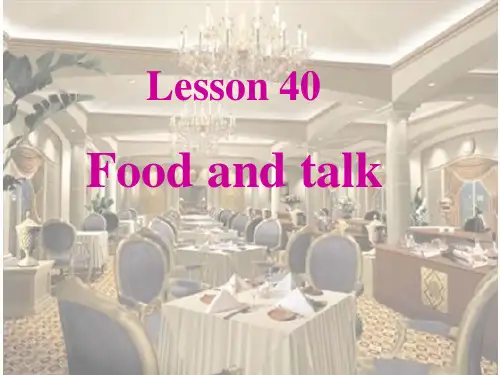
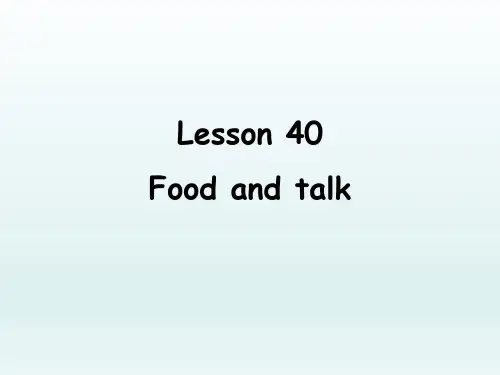
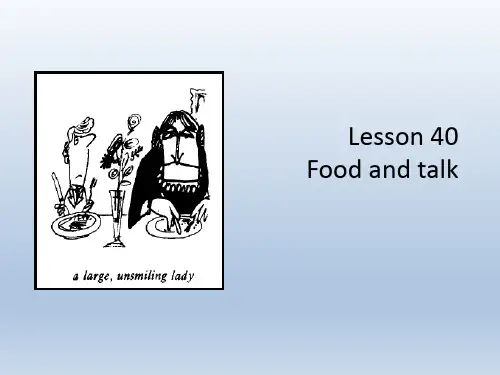
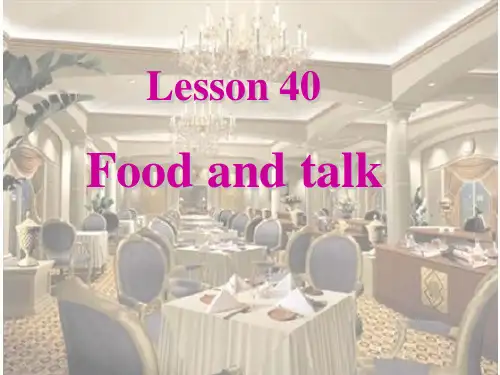
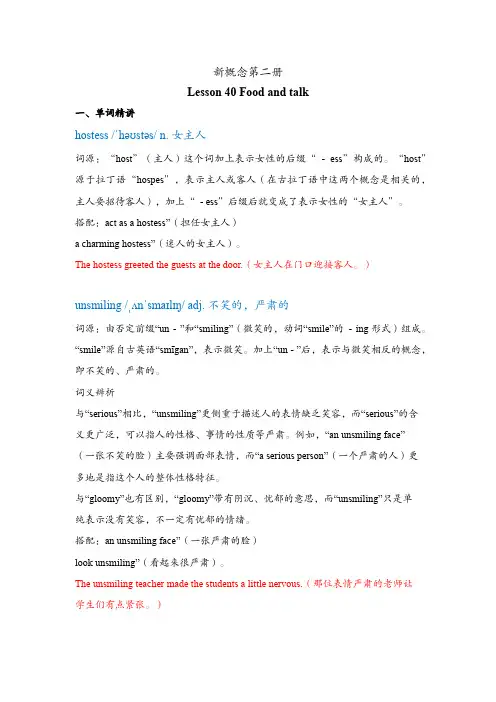
新概念第二册Lesson 40 Food and talk一、单词精讲hostess /ˈhəʊstəs/n.女主人词源:“host”(主人)这个词加上表示女性的后缀“-ess”构成的。
“host”源于拉丁语“hospes”,表示主人或客人(在古拉丁语中这两个概念是相关的,主人要招待客人),加上“- ess”后缀后就变成了表示女性的“女主人”。
搭配:act as a hostess”(担任女主人)a charming hostess”(迷人的女主人)。
The hostess greeted the guests at the door.(女主人在门口迎接客人。
)unsmiling /ˌʌnˈsmaɪlɪŋ/adj.不笑的,严肃的词源:由否定前缀“un - ”和“smiling”(微笑的,动词“smile”的- ing形式)组成。
“smile”源自古英语“smīgan”,表示微笑。
加上“un - ”后,表示与微笑相反的概念,即不笑的、严肃的。
词义辨析与“serious”相比,“unsmiling”更侧重于描述人的表情缺乏笑容,而“serious”的含义更广泛,可以指人的性格、事情的性质等严肃。
例如,“an unsmiling face”(一张不笑的脸)主要强调面部表情,而“a serious person”(一个严肃的人)更多地是指这个人的整体性格特征。
与“gloomy”也有区别,“gloomy”带有阴沉、忧郁的意思,而“unsmiling”只是单纯表示没有笑容,不一定有忧郁的情绪。
搭配:an unsmiling face”(一张严肃的脸)look unsmiling”(看起来很严肃)。
The unsmiling teacher made the students a little nervous.(那位表情严肃的老师让学生们有点紧张。
)tight /taɪt/adj.紧身的辨析:与“narrow”不同,“narrow”主要指宽度上狭窄,而“tight”侧重于物体对身体或其他物体的包裹程度紧。
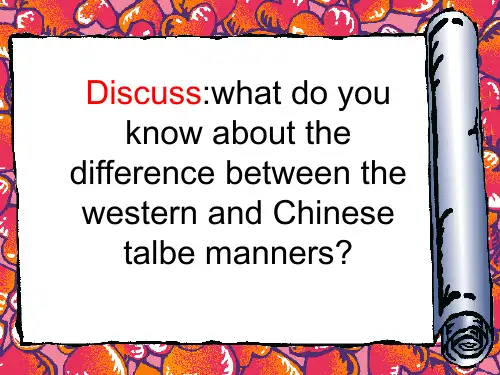
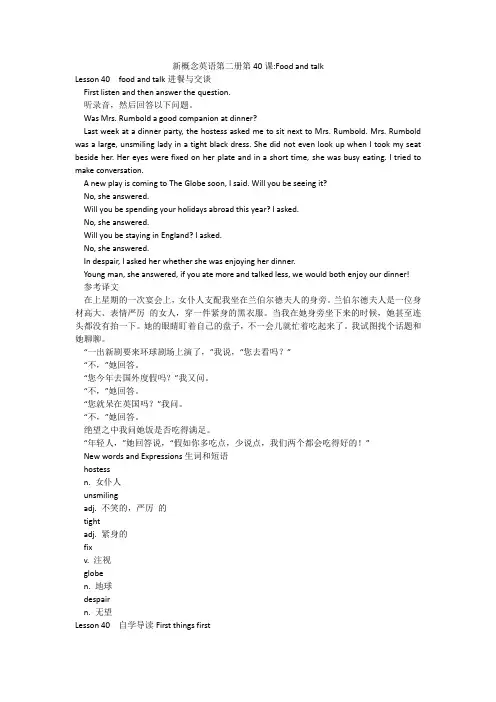
新概念英语第二册第40课:Food and talkLesson 40 food and talk进餐与交谈First listen and then answer the question.听录音,然后回答以下问题。
Was Mrs. Rumbold a good companion at dinner?Last week at a dinner party, the hostess asked me to sit next to Mrs. Rumbold. Mrs. Rumbold was a large, unsmiling lady in a tight black dress. She did not even look up when I took my seat beside her. Her eyes were fixed on her plate and in a short time, she was busy eating. I tried to make conversation.A new play is coming to The Globe soon, I said. Will you be seeing it?No, she answered.Will you be spending your holidays abroad this year? I asked.No, she answered.Will you be staying in England? I asked.No, she answered.In despair, I asked her whether she was enjoying her dinner.Young man, she answered, if you ate more and talked less, we would both enjoy our dinner!参考译文在上星期的一次宴会上,女仆人支配我坐在兰伯尔德夫人的身旁。
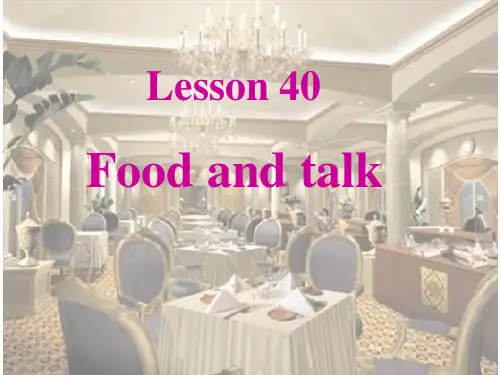
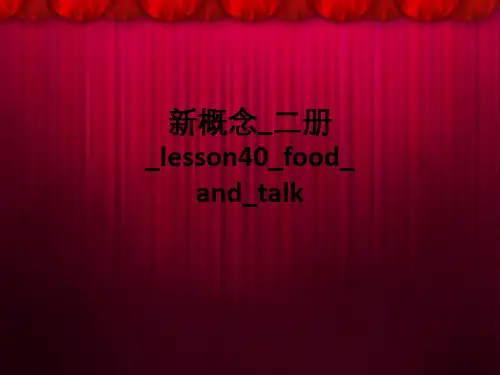
Lesson 40 Food and talk进餐与交谈—、单词讲解New words and expressionshostess n.女主人host1)n.待客的主人hostess 女主人the host nation 东道国,主办国2) n.在…上作主人,招待He acted as host to his father's friends.他作为主人招待他父亲的朋友。
3) n.旅店的老板,酒店老板landlord男老板;landlady 女老板unsmiling adj.不笑的,严肃的un:否定前缀unhappy 不快乐的unlucky 不走运的uncomfortable 不舒服的smiling adj.微笑的laughing adj.笑脸laughing faces 笑脸force a smile 强颜欢笑wear a smile 面带笑容例:She was all smiles.她满面笑容。
tight1) adj.紧的、不松的(反义词loose)a tight black dress 黑色的紧身衣2)adj.小气的,憋闷的A miser is tight with his money.一个小气鬼对钱是很吝音的。
fix1)V (使)固定,安装,修理,整理at the fixed time在规定的时间2)v.全神贯注于…尤指凝视fix one' s eyes on sth 全神贯注凝视某事fix one' s attention on sth 全神贯注于=fix one's thought on sthStare 瞪着眼睛看,盯着看glare 怒视,恶狠狠地盯着glare at sb/sthglance:take a quick look瞥一眼,看一下gaze [geiz] 久久地凝视,注视(通常指团惊讶或赞赏)look at 看globe n.球,球状物;地球(earth);地球仪all over the globe 全世界global adj.全球的环球的a global tour 环球旅行910balize V,使…全球化globalize the culture 使文化全球化globalization n.全球化real adj.真的realize v.是成为真的realization n.实现despair n.绝望,失望(反义词hope)in despair绝望地despairinglyHe left his hometown in despair.他绝望的离开了故乡。
逐句精讲新概念英语第二册:第40课进餐与交谈Lesson40 Food and Talk新概念2课文内容:Last week at a dinner-party, the hostess asked me to sit next to Mrs Rumbold. Mrs Rumbold was a large, unsmiling lady in a tight black dress. She did not even look up when I took my seat beside her. Her eyes were fixed on her plate and in a short time, she was busy eating.I tried to make conversation. 'A new play is coming to" The Globe" soon,' I said. "Will you be seeing it ?"'No,'she answered. 'Will you be spending your holidays abroad this year?' I asked. 'No,' she answered. 'Will you be staying in England?' I asked. 'No,' she answered. In despair, I asked her whether she was enjoying her dinner. 'Young man,' she answered,'if you ate more and talked less, we would both enjoy your dinner !'语法归纳:虚拟语气一句话总结:虚拟语气只用于非真实条件句中,表达假设的或实现可能性不大的情况,通常表达的只是一种愿望、假设、怀疑或是推测。
新概念英语第二册第40课:Food and talkLesson 40 food and talk进餐与交谈 First listen and then answer the question.听录音,然后回答以下问题。
Was Mrs. Rumbold a good companion at dinner?Last week at a dinner party, the hostess asked me to sit next to Mrs. Rumbold. Mrs. Rumbold was a large, unsmiling lady in a tight black dress. She did not even look up when I took my seat beside her. Her eyes were fixed on her plate and in a short time, she was busy eating. I tried to make conversation.'A new play is coming to "The Globe" soon,' I said. 'Will you be seeing it?''No,' she answered.'Will you be spending your holidays abroad this year?' I asked.'No,' she answered.'Will you be staying in England?' I asked.'No,' she answered.In despair, I asked her whether she was enjoying her dinner.'Young man,' she answered, 'if you ate more and talked less, we would both enjoy our dinner!"参考译文在上星期的一次宴会上,女主人安排我坐在兰伯尔德夫人的身旁。
兰伯尔德夫人是一位身材高大、表情严肃的女人,穿一件紧身的黑衣服。
当我在她身旁坐下来的时候,她甚至连头都没有抬一下。
她的眼睛盯着自己的盘子,不一会儿就忙着吃起来了。
我试图找个话题和她聊聊。
“一出新剧要来‘环球剧场’上演了,”我说,“您去看吗?”“不,”她回答。
“您今年去国外度假吗?”我又问。
“不,”她回答。
“您就呆在英国吗?”我问。
“不,”她回答。
失望之中我问她饭是否吃得满意。
“年轻人,”她回答说,“如果你多吃点,少说点,我们两个都会吃得好的!”New words and Expressions生词和短语hostessn. 女主人unsmilingadj. 不笑的,严肃的tightadj. 紧身的fixv. 凝视globen. 地球despairn. 绝望Lesson 40 自学导读First things first 课文详注 Further notes on the text1.next to, 挨着。
它既可以表示座位挨着也可以表示地理位置上挨着:Who was the man sitting next to you during the meeting?开会时坐在你旁边的那人是谁?There's a field/shop next to our house.我们家房子边上有一片田野/一个商店。
2.Mrs. Rumbold was a large, unsmiling lady in a tight black dress.兰伯尔德夫人是一位身材高大、表情严肃的女人,穿一件紧身的黑衣服。
(1)unsmiling的反义词为smiling(微笑的,喜气洋洋的)。
有些形容词前面可以加上前缀un-来表示相反的意义:comfortable (舒服的)/uncomfortable(不舒服的),true(真实的)/untrue(不真实的), interesting (有趣的)/uninteresting(无趣味的,乏味的)。
(2)in在这里表示“穿着”、“戴着”:A young man in a blue dress is inquiring for you.有位穿蓝衣服的小伙子在找您。
3.take one's seat, 在指定的位置上就座。
take a seat表示“坐下”,比sit要正式:Please take a seat.请坐。
take one's seat则表示位置事先已安排好:After everyone had taken his seat, the meeting/dinner party began.大家各自就座后,会议/宴会便开始了。
4.Her eyes were fixed on her plate and in a short time, she was busy eating. 她的眼睛盯着自己的盘子,不一会儿就忙着吃起来了。
(1)fix最常用的意思为“使……固定”、“安装”:she fixed a handle on the door.她在门上安了个把手。
fix on的含义之一为“使(目光、注意力等)集中于”、“盯着”:He fixed his eyes on the book, but he couldn't understand a word.他的眼睛盯着那本书,但他一个字儿也没看懂。
(2)busy+ doing sth.表示“忙着做某事”, doing前可以加 in,也可以不加:They are busy (in) repairing the car.他们正忙着修车。
We're all busy getting ready for the performance.我们都在忙着为演出进行准备。
5.If you ate more and talked less…如果你多吃点,少说点……在并列句中,相同的句子成分(如主语、谓语、状语等)通常由同一词性的单词/词组表示,并且它们的长度也差不多,以保持句子的平衡性。
在课文中的这句话中ate与talked对应,more与less对应。
再如:You can either go out or stay here.你出去也行,呆在这里也行。
He wants to buy a lot of things, but he has little money.他想买的东西很多,但他的钱很少。
语法 Grammar in use第2类条件句在第16课的语法中,我们学习了第1类条件句,它谈论将有可能发生的事情,并且考虑其将来的真实结果。
它的一般形式如下所示:You'll miss the train if you don't hurry.你如果不抓紧时间会误了火车的。
(主句用一般将来时,从句用一般现在时或其他形式的现在时)第2类条件句的形式与第一类不同,if从句中用一般过去时,谈论想像的情况,主句用would +动词原形,推测想像的结果:If it rained tomorrow, we'd stay at home.如果明天下雨,我们将呆在家里。
尽管第2类条件句使用过去时,却并非指过去的时间,所以,if之后的过去时用法常被称为“非真实的过去”。
第2类条件句有时可以代替第1类条件句来描述颇有可能发生的事情,但比第1类条件句较为“无把握”。
试比较:If you went by train,you would get there earlier.如果你坐火车去。
你或许会早些到那儿。
If you go by train,you will get there earlier.如果你坐火车去,你就会到得早些。
不过第2类条件句经常用来描写完全不可能的事情:If I had longer legs, I'd be able to run faster.如果我的腿再长一点儿,我就能跑得更快了。
在最后一个例句中,the weather是单数,按语法规则,在正常的陈述句中它后面应为was而不是were。
但在第2类条件句中,were比was更为正式,与真实情况的差别也更大:If he were/was ready, I would go.如果他准备好了,我就去。
if I were you这种说法经常用于提出建议:If I were you, I'd accept their offer.如果我是你,我就接受他们的建议。
词汇学习 Word study1.make vt., vi.及物动词make的原义为“制造”,但它经常用于一些固定的结构,最常见的为make +(冠词)+名词形式。
因名词的不同其含义也稍有不同:I tried to make conversation.我试图找个话题。
If you like, I'll make the beds this morning.如果你愿意,今天早上我来铺床。
Don't make so much noise when I'm reading.我看书时你(们)别这么吵闹。
He made a promise that he would return the books in a week.他保证一星期后将书还回来。
If you make trouble again, I'll send you home.你如果再捣蛋,我就把你送回家。
He works very hard, but he's made little progrss.他很刻苦,但他进步甚小。
He makes a lot of money and he also spends a lot.他挣钱多,花钱也多。
Can you make a speech for our students?您能为我们的学生演讲一次吗?I'm sorry to tell you that you've made a big mistake.我很遗憾地告诉你,你犯了个大错误。
在表示“下定决心”、“拿定王意”时要用词组make up one's mind:Have you made up your mind to set off tomorrow morning?你已下定决心要明天早上出发了吗?2.do vt.与make一样,完全动词do也可以用于一些固定说法,它的含义比make要更笼统一些:I had done my best, but I still failed in the exam.我已经尽力而为了,但我考试还是没及格。